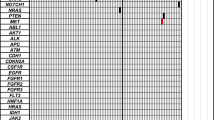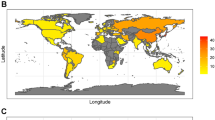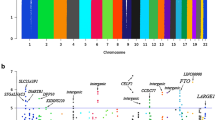Abstract
Recent studies have revealed elevated expression of transforming growth factor β1 (TGF-β1) in gastric mucosa of patients with gastric cancer (GC) and those undergoing ulcer repair. As production of TGF-β1 is genetically regulated, we aimed to assess whether functional polymorphisms of the TGFB1 gene are involved in susceptibility to and clinical characteristics of Helicobacter pylori-related diseases. DNA from 142 unrelated Spanish patients with GC, 200 with peptic ulcer and 342 healthy controls was typed for the MspA1I T+869C, and the Sau96I G+915C polymorphisms of the TGFB1 gene using polymerase chain reaction and RFLP analysis. H. pylori infection and CagA/VacA antibody status were determined by Western blot in patients and controls. H. pylori infection (odds ratio (OR): 11.44; 95% confidence interval (CI): 4.45–29.42; P<0.001) and non-steroidal anti-inflammatory drugs (OR: 5.07; 95% CI: 2.53–10.16; P<0.001) were identified as independent risks factors for duodenal ulcer (DU), whereas the TGFB1+869*C/C genotype was associated with reduced risk of developing the disease (OR: 0.32; 95% CI=0.15–0.68; P=0.003). Our results show that the TGFB1 T+869C gene polymorphism is involved in the susceptibility to DU and provide further evidence that host genetic factors play a key role in the pathogenesis of H. pylori-related diseases.
This is a preview of subscription content, access via your institution
Access options
Subscribe to this journal
Receive 6 digital issues and online access to articles
$119.00 per year
only $19.83 per issue
Buy this article
- Purchase on Springer Link
- Instant access to full article PDF
Prices may be subject to local taxes which are calculated during checkout
Similar content being viewed by others
References
Goodwin CS, Mendall MM, Northfield TC . Helicobacter pylori infection. Lancet 1997; 349: 265–269.
Atherton JC . H. pylori virulence factors. Br Med Bull 1998; 54: 105–120.
Atherton JC, Cao P, Peek Jr RM, Tummuru MK, Blaser MJ, Cover TL . Mosaicism in vacuolating cytotoxin alleles of Helicobacter pylori. Association of specific vacA types with cytotoxin production and peptic ulceration. J Biol Chem 1995; 270: 17771–17777.
Censini S, Lange C, Xiang Z, Crabtree JE, Ghiara P, Borodovsky M et al. A. Cag, a pathogenicity island of Helicobacter pylori, encodes type I-specific and disease-associated virulence factors. Proc Natl Acad Sci USA 1996; 93: 14648–14653.
Enroth H, Kraaz W, Engstrand L, Nyren O, Rohan T . Helicobacter pylori strain types and risk of gastric cancer: a case–control study. Cancer Epidemiol Biomarkers Prev 2000; 9: 981–985.
Graham DY, Yamaoka Y . Disease-specific Helicobacter pylori virulence factors: the unfulfilled promise. Helicobacter 2000; 5: S3–S9.
Maeda S, Kanai F, Ogura K, Yoshida H, Ikenoue T, Takahashi M et al. High seropositivity of anti-CagA antibody in Helicobacter pylori-infected patients irrelevant to peptic ulcers and normal mucosa in Japan. Dig Dis Sci 1997; 42: 1841–1847.
Hansson LE, Nyren O, Hsing AW, Bergstrom R, Josefsson S, Chow WH et al. The risk of stomach cancer in patients with gastric or duodenal ulcer disease. N Engl J Med 1996; 335: 242–249.
Uemura N, Okamoto S, Yamamoto S, Matsumura N, Yamaguchi S, Yamakido M et al. Helicobacter pylori infection and the development of gastric cancer. N Engl J Med 2001; 345: 784–789.
Ebert MP, Yu J, Miehlke S, Fei G, Lendeckel U, Ridwelski K et al. Expression of transforming growth factor beta-1 in gastric cancer and in the gastric mucosa of first-degree relatives of patients with gastric cancer. Br J Cancer 2000; 82: 1795–1800.
Milani S, Calabro A . Role of growth factors and their receptors in gastric ulcer healing. Microsc Res Tech 2001; 53: 360–371.
Shih SC, Tseng KW, Lin SC, Kao CR, Chou SY, Wang HY et al. Expression patterns of transforming growth factor-beta and its receptors in gastric mucosa of patients with refractory gastric ulcer. World J Gastroenterol 2005; 11: 136–141.
Ernst H, Konturek PC, Brzozowski T, Konturek SJ, Hahn EG . Subserosal application of transforming growth factor-beta 1 in rats with chronic gastric ulcers: effect on gastric ulcer healing and blood flow. J Physiol Pharmacol 1996; 47: 443–454.
Perez-Aisa A, Sopena F, Arceiz E, Ortego J, Sainz R, Lanas A . Effect of exogenous administration of transforming growth factor-beta and famotidine on the healing of duodenal ulcer under the impact of indomethacin. Dig Liver Dis 2003; 35: 397–403.
Maehara Y, Kakeji Y, Kabashima A, Emi Y, Watanabe A, Akazawa K et al. Role of transforming growth factor-beta 1 in invasion and metastasis in gastric carcinoma. J Clin Oncol 1999; 17: 607–614.
Hahm KB, Lee KM, Kim YB, Hong WS, Lee WH, Han SU et al. Conditional loss of TGF-beta signalling leads to increased susceptibility to gastrointestinal carcinogenesis in mice. Aliment Pharmacol Ther 2002; 16 (Suppl 2): 115–127.
Lehmann K, Janda E, Pierreux CE, Rytomaa M, Schulze A, McMahon M et al. Raf induces TGF beta production while blocking its apoptotic but not invasive responses: a mechanism leading to increased malignancy in epithelial cells. Genes Dev 2000; 14: 2610–2622.
Awad MR, El-Gamel A, Hasleton P, Turner DM, Sinnott PJ, Hutchinson IV . Genotypic variation in the transforming growth factor-beta1 gene: association with transforming growth factor-beta1 production, fibrotic lung disease, and graft fibrosis after lung transplantation. Transplantation 1998; 66: 1014–1020.
Yamada Y, Miyauchi A, Goto J, Takagi Y, Okuizumi H, Kanematsu M et al. Association of a polymorphism of the transforming growth factor-beta1 gene with genetic susceptibility to osteoporosis in postmenopausal Japanese women. J Bone Miner Res 1998; 13: 1569–1576.
Cambien F, Ricard S, Troesch A, Mallet C, Generenaz L, Evans A et al. Polymorphisms of the transforming growth factor-beta 1 gene in relation to myocardial infarction and blood pressure. The Etude Cas-Temoin de l’Infarctus du Myocarde (ECTIM) Study. Hypertension 1996; 28: 881–887.
Garcia-Gonzalez MA, Crusius JB, Strunk MH, Bouma G, Perez-Centeno CM, Pals G et al. TGFB1 gene polymorphisms and inflammatory bowel disease. Immunogenetics 2000; 51: 869–872.
Schrijver HM, Crusius JB, Garcia-Gonzalez MA, Polman CH, Pena AS, Barkhof F et al. Gender-related association between the TGFB1+869 polymorphism and multiple sclerosis. J Interferon Cytokine Res 2004; 24: 536–542.
van der Paardt M, Crusius JB, Garcia-Gonzalez MA, Dijkmans BA, Pena AS, van der Horst-Bruinsma IE . Susceptibility to ankylosing spondylitis: no evidence for the involvement of transforming growth factor beta 1 (TGFB1) gene polymorphisms. Ann Rheum Dis 2005; 64: 616–619.
Shih SC, Chien CL, Tseng KW, Lin SC, Kao CR . Immunohistochemical studies of transforming growth factor-beta and its receptors in the gastric mucosa of patients with refractory gastric ulcer. J Formos Med Assoc 1999; 98: 613–620.
Massague J . The transforming growth factor-beta family. Annu Rev Cell Biol 1990; 6: 597–641.
Kingsley DM . The TGF-beta superfamily: new members, new receptors, and new genetic tests of function in different organisms. Genes Dev 1994; 8: 133–146.
Walter P, Johnson AE . Signal sequence recognition and protein targeting to the endoplasmic reticulum membrane. Annu Rev Cell Biol 1994; 10: 87–119.
Andreassen CN, Alsner J, Overgaard J, Herskind C, Haviland J, Owen R et al. TGFB1 polymorphisms are associated with risk of late normal tissue complications in the breast after radiotherapy for early breast cancer. Radiother Oncol 2005; 75: 18–21.
Ewart-Toland A, Chan JM, Yuan J, Balmain A, Ma J . A gain of function TGFB1 polymorphism may be associated with late stage prostate cancer. Cancer Epidemiol Biomarkers Prev 2004; 13: 759–764.
Leung WK, Chan MC, To KF, Man EP, Ng EK, Chu ES et al. H. pylori genotypes and cytokine gene polymorphisms influence the development of gastric intestinal metaplasia in a Chinese population. Am J Gastroenterol 2006; 101: 714–720.
Wang KS, Hu ZL, Li JH, Xiao DS, Wen JF . Enhancement of metastatic and invasive capacity of gastric cancer cells by transforming growth factor-beta1. Acta Biochim Biophys Sin (Shanghai) 2006; 38: 179–186.
Furuta T, El-Omar EM, Xiao F, Shirai N, Takashima M, Sugimura H . Interleukin 1beta polymorphisms increase risk of hypochlorhydria and atrophic gastritis and reduce risk of duodenal ulcer recurrence in Japan. Gastroenterology 2002; 123: 92–105.
McColl KE, el-Omar E . Helicobacter pylori and disturbance of gastric function associated with duodenal ulcer disease and gastric cancer. Scand J Gastroenterol Suppl 1996; 215: 32–37.
Kai T, Taketazu F, Kawakami M, Shimanuki K, Yamada S, Miyazono K et al. Distribution of transforming growth factor-beta and its receptors in gastric carcinoma tissue. Jpn J Cancer Res 1996; 87: 296–304.
Beckert S, Wolf SC, Farrahi F, Zittel TT, Coerper S . TGF-beta inhibits pentagastrin-stimulated gastric acid secretion in rats. Med Sci Monit 2005; 11: 80–83.
Sobala GM, Schorah CJ, Sanderson M, Dixon MF, Tompkins DS, Godwin P et al. Ascorbic acid in the human stomach. Gastroenterology 1989; 97: 357–363.
Bartsch H, Ohshima H, Pignatelli B . Inhibitors of endogenous nitrosation. Mechanisms and implications in human cancer prevention. Mutat Res 1988; 202: 307–324.
Graham MF, Bryson GR, Diegelmann RF . Transforming growth factor beta 1 selectively augments collagen synthesis by human intestinal smooth muscle cells. Gastroenterology 1990; 99: 447–453.
Moustakas A, Pardali K, Gaal A, Heldin CH . Mechanisms of TGF-beta signaling in regulation of cell growth and differentiation. Immunol Lett 2002; 82: 85–91.
Risau W . Mechanisms of angiogenesis. Nature 1997; 386: 671–674.
Beck PL, Rosenberg IM, Xavier RJ, Koh T, Wong JF, Podolsky DK . Transforming growth factor-beta mediates intestinal healing and susceptibility to injury in vitro and in vivo through epithelial cells. Am J Pathol 2003; 162: 597–608.
Dunning AM, Ellis PD, McBride S, Kirschenlohr HL, Healey CS, Kemp PR et al. A transforming growth factor beta1 signal peptide variant increases secretion in vitro and is associated with increased incidence of invasive breast cancer. Cancer Res 2003; 63: 2610–2615.
Yokota M, Ichihara S, Lin TL, Nakashima N, Yamada Y . Association of a T29−>C polymorphism of the transforming growth factor-beta1 gene with genetic susceptibility to myocardial infarction in Japanese. Circulation 2000; 101: 2783–2787.
Kurata JH, Nogawa AN . Meta-analysis of risk factors for peptic ulcer. Nonsteroidal antiinflammatory drugs, Helicobacter pylori, and smoking. J Clin Gastroenterol 1997; 24: 2–17.
Figueiredo C, Machado JC, Pharoah P, Seruca R, Sousa S, Carvalho R et al. Helicobacter pylori and interleukin 1 genotyping: an opportunity to identify high-risk individuals for gastric carcinoma. J Natl Cancer Inst 2002; 94: 1680–1687.
Garcia-Gonzalez MA, Lanas A, Santolaria S, Crusius JB, Serrano MT, Pena AS . The polymorphic IL-1B and IL-1RN genes in the aetiopathogenesis of peptic ulcer. Clin Exp Immunol 2001; 125: 368–375.
Lanas A, Garcia-Gonzalez MA, Santolaria S, Crusius JB, Serrano MT, Benito R et al. TNF and LTA gene polymorphisms reveal different risk in gastric and duodenal ulcer patients. Genes Immun 2001; 2: 415–421.
García-González MA, Strunk M, Benito R, Santolaria S, Piazuelo E, Jiménez P et al. Lack of association of IL-1 family, TNF and TGFB1 gene polymorphisms with noncardia gastric cancer in a population with high Helicobacter pylori infection rate. Gastroenterology 2004; 126: A454.
El-Omar EM, Carrington M, Chow WH, McColl KE, Bream JH, Young HA et al. Interleukin-1 polymorphisms associated with increased risk of gastric cancer. Nature 2000; 404: 398–402.
El-Omar EM, Rabkin CS, Gammon MD, Vaughan TL, Risch HA, Schoenberg JB et al. Increased risk of noncardia gastric cancer associated with proinflammatory cytokine gene polymorphisms. Gastroenterology 2003; 124: 1193–1201.
Machado JC, Pharoah P, Sousa S, Carvalho R, Oliveira C, Figueiredo C et al. Interleukin 1B and interleukin 1RN polymorphisms are associated with increased risk of gastric carcinoma. Gastroenterology 2001; 121: 823–829.
Kamangar F, Abnet CC, Hutchinson AA, Newschaffer CJ, Helzlsouer K, Shugart YY et al. Polymorphisms in inflammation-related genes and risk of gastric cancer (Finland). Cancer Causes Control 2006; 17: 117–125.
Perri F, Piepoli A, Bonvicini C, Gentile A, Quitadamo M, Di Candia M et al. Cytokine gene polymorphisms in gastric cancer patients from two Italian areas at high and low cancer prevalence. Cytokine 2005; 30: 293–302.
Zambon CF, Basso D, Navaglia F, Falda A, Belluco C, Fogar P et al. Increased risk of noncardia gastric cancer associated with proinflammatory cytokine gene polymorphisms. Gastroenterology 2004; 126: 382–384.
Lauren P . The two histological main types of gastric carcinoma: diffuse and so-called intestinal-type carcinoma. An attempt at a histo-clinical classification. Acta Pathol Microbiol Scand 1965; 64: 31–49.
Santolaria S, Lanas A, Benito R, Parez-Aisa MA, Montoro M, Sainz R . Helicobacter pylori infection is a protective factor for bleeding gastric ulcers but not for bleeding duodenal ulcers in NSAID users. Aliment Pharmacol Ther 1999; 13: 1511–1518.
Santolaria S, Barrios Y, Benito R, Piazuelo E, Quintero E, Lanas A . Helicobacter pylori and immunogenetic factors of the host: relevance of the HLADQA1 *0102 and *0301 alleles in peptic ulcer. Gastroenterol Hepatol 2001; 24: 117–121.
Lanas A, Sekar MC, Hirschowitz BI . Objective evidence of aspirin use in both ulcer and nonulcer upper and lower gastrointestinal bleeding. Gastroenterology 1992; 103: 862–869.
Acknowledgements
This study was supported by grants from the Spanish Fondo de Investigaciones Sanitarias (Exp: 00/3035 and Exp: PI05/2739) and Instituto de Salud Carlos III (RNIHG Red C03/02).
Author information
Authors and Affiliations
Corresponding author
Rights and permissions
About this article
Cite this article
Garcia-Gonzalez, M., Strunk, M., Piazuelo, E. et al. TGFB1 gene polymorphisms: their relevance in the susceptibility to Helicobacter pylori-related diseases. Genes Immun 7, 640–646 (2006). https://doi.org/10.1038/sj.gene.6364341
Received:
Revised:
Accepted:
Published:
Issue Date:
DOI: https://doi.org/10.1038/sj.gene.6364341
Keywords
This article is cited by
-
TGF-β1 +869C/T polymorphism increases susceptibility to rheumatoid arthritis in North Indian population
Clinical Rheumatology (2020)
-
Clinical relevance of single nucleotide polymorphisms within the 13 cytokine genes in North Indian trauma hemorrhagic shock patients
Scandinavian Journal of Trauma, Resuscitation and Emergency Medicine (2015)
-
An updated meta-analysis of transforming growth factor-β1 gene: three polymorphisms with gastric cancer
Tumor Biology (2014)
-
Cell proliferation-related genetic polymorphisms and gastric cancer risk: systematic review and meta-analysis
European Journal of Human Genetics (2009)
-
Helicobacter pylori and gastric cancer
Gastric Cancer (2009)



